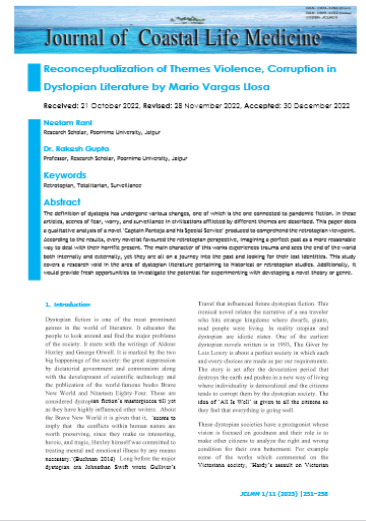Reconceptualization of Themes Violence, Corruption in Dystopian Literature by Mario Vargas Llosa
Main Article Content
Abstract
The definition of dystopia has undergone various changes, one of which is the one connected to pandemic fiction. In these articles, scenes of fear, worry, and surveillance in civilizations afflicted by different themes are described. This paper does a qualitative analysis of a novel ‘Captain Pantoja and his Special Service’ produced to comprehend the retrotopian viewpoint. According to the results, every novelist favoured the retrotopian perspective, imagining a perfect past as a more reasonable way to deal with their horrific present. The main character of this works experiences trauma and sees the end of the world both internally and externally, yet they are all on a journey into the past and looking for their lost identities. This study covers a research void in the area of dystopian literature pertaining to historical or retrotopian studies. Additionally, it would provide fresh opportunities to investigate the potential for experimenting with developing a novel theory or genre.
Article Details
References
Aguirre, C. (2013). Juan E. De Castro. Mario Vargas Llosa. Public Intellectual in Neoliberal Latin America. Tucson: University of Arizona Press, 2011, 2.
Ahmed, T. (2010). In ‘prison-house of love: The Bad Girl and bad girls of Mario Vargas Llosa. Rupkatha Journal on Interdisciplinary Studies in Humanities, 2(3), 3.
Alcoff, L. (1988). Cultural feminism versus post-structuralism: The identity crisis in feminist theory. Signs: Journal of women in culture and society, 13(3), 5.
Atwood, M. (2004). The Handmaid’s Tale and Oryx and Crake in Context. PmLa, 119(3), 5.
Awan, A. G., & Raza, S. A. (2016). The Effects of Totalitarianism and Marxism towards Dystopian society in George Orwell's selected fictions. Global Journal of Management and Social Sciences, 2(4), 5.
Bradbury, R. (1962). Fahrenheit 451. 1950. New York: Ballantine, 7-19.
Cole, J. (2011). Mario Vargas Llosa: An Intellectual Journey Estudios sobre Mario Vargas Llosa View project Studies on Milton Friedman View project (pp. 5–13). The Independent Review.
Dystopia. (2010). Merriam-Webster’s online dictionary. Retrieved from http://www.merriam-webster.com/dictionary/dystopia
Gardner, N. L. (1995). Gabriel Garcia Marquez| The novel journalist, 6.
Glover, J. (2009). Human/Nature: Ecological Philosophy in Margaret Atwood's Oryx and Crake. English Studies in Africa, 52(2) 4.
Llosa, M. V. (2001, May 14). Why Literature? The New Republic.

